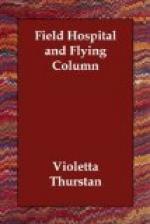On the first day of our arrival in Denmark came the news of the downfall of Antwerp, and through all these delightful invitations and receptions there was a feeling in my heart that I was not free yet to enjoy myself. The downfall of Antwerp seemed almost like a personal loss. We had been so close to it, had shared our Belgian friends’ hopes and fears, had watched the big German howitzers going out on the Antwerp road, had heard the bombardment of the forts, on our long journey through Belgium had seen the enormous reinforcements being sent up to take it. And now it had gone, and the Germans were marching on Ostend. What was the end of all this going to be? We must win in the end—but they are so strong and well organized—so dreadfully strong.
In that same paper I read an account from a Russian correspondent, telling of the distress in Poland, which they described as the “Belgium of Russia.” It stated that the news just then was not good; the Germans were approaching Warsaw, and that the people in many of the villages were almost starving, as the Germans had eaten up almost everything. (How well I could believe that!) The paper went on to say that the troops were suffering severely from cholera and from typhoid fever and that there was a great scarcity of trained nurses. That gave me the clue for which I was unconsciously seeking—we had been turned out of Belgium, and now, perhaps, our work was to be in that other Belgium of Russia.
Three other Sisters wished to join me, and I telegraphed to St. John’s to ask permission to offer our services to the Russian Red Cross. The answer was delayed, and as we could not go to Russia without permission from headquarters, we most reluctantly prepared to go back to England with all the others.
On the last morning our luggage, labelled Christiania-Bergen-Newcastle, had already gone down to the station when the expected telegram arrived: “You and three Sisters named may volunteer Russian Red Cross.” We flew down to the station and by dint of many tips and great exertions we got our luggage out again. I should have been sorry to have lost my little all for the second time.
This permission to serve with the Russian Red Cross was confirmed later by a most kind letter from Sir Claude Macdonald, chairman of the St. John’s Committee, so we felt quite happy about our enterprise.
We could not start for Russia for another ten days. We were to be inoculated against cholera for one thing, and then there were passports and vises to get and arrangements for the journey to be made. The ordinary route was by Aboe, Stockholm and Helsingfors, but we were very strongly advised not to go this way, first, because of the possibility of mines in the Baltic, and, secondly, because a steamer, recently crossing that way, had been actually boarded, and some English people taken off by the Germans. And we had no desire to be caught a second time.




